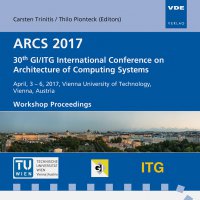Incentive-oriented Task Assignment in Holonic Organic Systems
Conference: ARCS 2017 - 30th International Conference on Architecture of Computing Systems
04/03/2017 - 04/06/2017 at Vienna, Austria
Proceedings: ARCS 2017
Pages: 8Language: englishTyp: PDF
Personal VDE Members are entitled to a 10% discount on this title
Authors:
Kantert, Jan; Mueller-Schloer, Christian (Institute of Systems Engineering, Leibniz University Hanover, Appelstr. 4, 30167 Hanover, Germany)
Tomforde, Sven (Intelligent Embedded Systems Group, University of Kassel, Wilhelmshöher Allee 73, 34121 Kassel, Germany)
Diaconescu, Ada (Telecom ParisTech IMT, Paris-Saclay University, 46 rue Barrault, 75013 Paris, France)
Abstract:
Organic Computing is faced with the challenge that systems are increasingly open, i.e. autonomous entities may decide to participate in the overall system or not. As a result, the system composition is characterised by uncertainty, especially in terms of the resulting structure. A promising approach to handle the effects introduced by uncertainty is to establish trust-based relationships among distributed agents. The basic idea is to utilise the experiences made with a certain agent and take the aggregated information about its behaviour into account when deciding about, e.g., task assignment strategies. In this paper, we utilise grid computing as application domain for Organic Computing technology and extend the concept of trust-based task assignment by means of a concept for external incentive mechanisms. We demonstrate how task distribution can be done in a self-organised manner and simultaneously depending on the reliability and trustworthiness of agents. We further show how the agents that process tasks assigned can maximise their profit and which impact the process has on their trust level. In addition, we show that a holonic system structure supports the task distribution process and leads to an optimised efficiency in the processing behaviour. We analyse the behaviour in terms of processing speed, task success, and efficiency.


